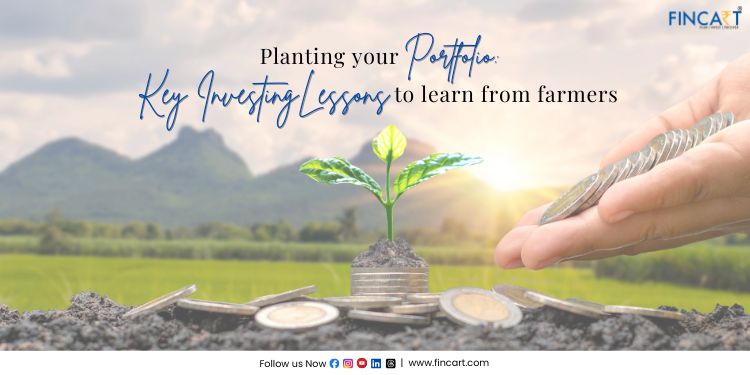In both farming and investing, success often depends on patience, careful planning, and adapting to changing conditions. Despite their apparent differences, farmers and investors share common traits and face similar challenges as they work towards their goals.
First, learn the rules:
First, let’s talk about learning the basics. Farming might look easy, but it’s actually quite complex. You need to understand how to do it right. That means knowing how to prepare the soil, choosing the right seeds, and making sure the plants have the right conditions to grow. It’s kind of like a game for learners—if you don’t know the rules, you might end up with plants that don’t make it.
The same goes for investing. Instead of making wild predictions like “The stock market will reach 25,000!” or “This stock will make you rich!”, it’s better to take the time to learn. Learn about the simple rules of investing that will help you make smart choices for a long time.
Don’t blame your investments for not growing fast enough:
Don’t get upset if your investments aren’t growing super-fast. When you invest your money, think about whether you’re expecting instant results or if you’re willing to wait patiently. Even though we’ve heard about compounding, not everyone realizes how important time is for it to work its magic on your investments.
Here’s the deal: the longer you keep your money invested, the more chances it has to grow. It’s like planting seeds and watching them turn into big, profitable crops over time. Starting to invest early gives your money more time to grow, which can lead to even bigger returns in the long run. So, be patient and let your investments do their thing.
Don’t uproot your investments before time:
Don’t rush to pull out your investments too soon. Just like different crops take different amounts of time to grow, different investments also have their own pace of growth. Some might take a while to show results, while others might grow quickly.
Taking out your investments early, either because you’re impatient or because you think they’re not growing fast enough, can cause problems. This is a common mistake among many investors today. They jump in and out of the market without really thinking about their investments properly.
Unlike farmers who carefully plan which crops to plant and when, some investors hastily jump into new investment opportunities without fully understanding the risks and benefits. And then, they might sell off their investments too quickly without giving them enough time to grow.
So, take your time and give your investments the chance to reach their full potential before you decide to sell them off. Rushing into decisions can lead to missed opportunities and regrets later on.
Choose the best plants aka the right investments:
Have you noticed how farmers pick the right plants for their soil? Similarly, in the financial world, there are lots of terms like price, value, compounding, and others that can make choosing investments tricky. It’s important to pick the right investments, but it can be complicated. Many people rely on what they hear from others instead of doing their own research on things like stocks, debt, and how long they should invest for. It’s like farmers choosing the best plants for their fields – you need to do your homework to make the right choices for your money.
Remove weeds aka get rid of the non-performers:
Getting rid of weeds in farming is similar to managing investments in some interesting ways. Just like weeds compete with crops for nutrients and water, bad investments can hold back your financial growth. It’s important to take action to deal with them. Both weeding and managing investments require you to actively get rid of things that aren’t helping. The timing and strategy you use are crucial in both cases. Just as weeding works best when done at the right time, making decisions about buying or selling investments at the right moment can make a big difference in how well your investments perform.
Be prepared for both the good and the bad:
Predicting what the market will do with investments is like preparing for different weather conditions in farming. Just as farmers plant different crops to deal with different seasons, you should spread your investments across different types of assets like stocks, bonds, and real estate. This helps reduce the risks.
Farmers aren’t scared of bad weather; they get ready for it by saving up some good news and getting ready to plant the next round of crops. Likewise, you should have a “rainy day” fund – some money set aside for unexpected expenses or if the market takes a downturn. This way, you don’t have to sell your investments when things aren’t going well.
Nurture both your crops and investments:
Cultivating your investments is a lot like how farmers take care of their crops. Just like farmers use furrows or basins to guide water across their fields and make sure each plant gets enough, you need to stay on top of your investments.
Being vigilant is crucial. Keep an eye out for signs of market downturns so you can make smart decisions. When the market is down, it can be a good time to invest more money or add quality stocks to your portfolio.
Many investors find the comparison between watering crops and managing investments interesting. Both involve carefully managing a valuable resource – water for crops and money for investments. They both require long-term planning and attention to detail. Just like farmers nurture their crops to grow healthy and strong, you need to nurture your investments to help them grow over time.
Water your plantings:
Just like you don’t need to water your plants every day or they might drown, you don’t need to invest a huge amount of money all at once to grow your wealth. Instead, it’s better to invest a little bit regularly.
Consistency is key in investing. Making small investments every month adds up over time and helps your money grow steadily. It’s like giving your plants just the right amount of water to help them thrive.
By investing regularly, you take advantage of the power of compounding. Your money earns returns, and then those returns earn more returns. Over the long term, this can lead to significant growth in your wealth. So, don’t worry about making big investments all at once. Just focus on investing regularly, and watch your wealth grow over time.




